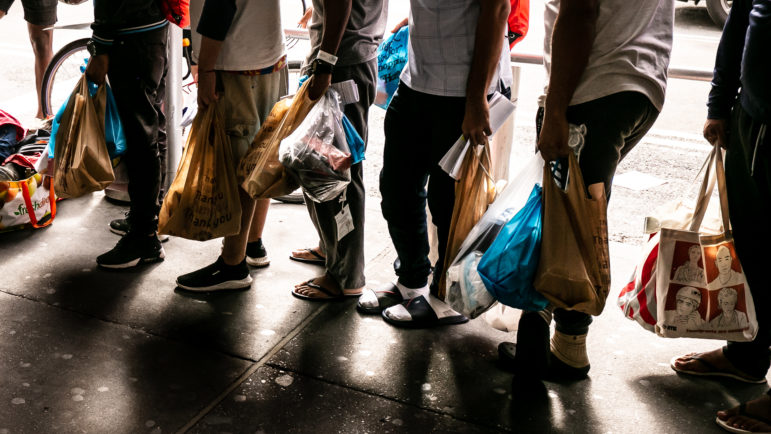Sources familiar with the plan say the city is looking to open 950 shelter beds at sites run by dozens of religious organizations in the coming months.

Adi Talwar
Immigrants who arrived in New York City on one of the three buses from Texas in August 2022.
The city is in talks to house immigrant asylum seekers in sites run by 50 houses of worship of various denominations across the five boroughs, providing shelter for some 950 people in the coming months, City Limits has learned.
The potential two-year contract with the religious organizations, led by New York Disaster Interfaith Services (NYDIS), is the latest effort by Mayor Eric Adams’ administration to find places to house over 44,000 asylum seekers currently in the city’s care, out of the more than 73,000 who have arrived in the city since last year.
NYC Emergency Management, which has been coordinating part of the city’s response, referred City Limits to the mayor’s press office, but City Hall declined to comment.
New York City already utilizes a small number of “faith beds” where 36 people slept Tuesday night, according to the most recent homeless census data. The city has long partnered with a coalition of religious organizations, known as the Emergency Shelter Network, to provide an alternative to large municipal shelters, especially during times of crisis.
Their use was cut under Mayor Michael Bloomberg, creating what some say is untapped potential to boost shelter capacity as the city now scrambles to open sites to house new immigrant arrivals, now averaging 602 people per day. The administration has converted more than 150 hotels into emergency shelters in response to the humanitarian crisis in recent months, as well as bussed asylum seekers to counties outside the five boroughs.
“I think the church can do more,” said Félix Cepeda, a Catholic activist and former Jesuit brother in the Dominican Republic who has long called for the city’s churches to provide refuge for immigrants.
Joseph Zwilling, the spokesperson for the Archdiocese of New York, told City Limits via email that the archdiocese has been in conversations with the city regarding the potential use of certain parish properties to house recently arrived migrants, but did not provide additional details. It’s not clear if those discussions are related to the same contract being considered for NYDIS.
The potential expansion of faith-based beds comes as Mayor Adams seeks court permission to modify New York City’s decades-old right-to-shelter policy, which provides a basic safety net by allowing anyone in need of a place to stay overnight access to shelter.
While housing advocates slammed the effort, Mayor Adams defended the move, saying the city “cannot single-handedly provide care to everyone crossing our border.” The city now has more asylum seekers than New Yorkers experiencing homelessness when he first came into office, said Adams, who has been pressing the federal government for additional financial support.
Churches, especially Catholic churches, have hundreds of spaces around the city that could be adapted to accommodate people, said Rev. Juan Carlos Ruiz, pastor of The Lutheran Church of The Good Shepherd in Bay Ridge.
Ruiz said he heard about the pending shelter initiative from other religious leaders but wasn’t interested in his own church taking part. “I don’t see a plan that indicates how these people are going to get ahead after a year,” Ruiz said in Spanish, insisting on the need for immigrants to access stable housing programs in the city instead of temporary shelter.
Since April, the parties involved in the contract talks—NYDIS, in conjunction with Project Hospitality and Interfaith Center of New York—have been circulating a form to the city’s religious organizations to determine if their facilities are eligible to serve as a shelter. Sites need to have a security guard, shelter coordinator, bathrooms and showers as well as cots, bedding, towels, and storage trunks, and to adhere to city building and fire safety code requirements.
“The cost is less than half compared to hotels, per asylum seeker per night,” said Rev. Chloe Breyer, executive director of The Interfaith Center of New York, who penned a Daily New oped earlier this year imploring the city to involve more religious organizations in the crisis response.
Office of Management and Budget Director Jacques Jiha said during a press briefing Wednesday that the city is spending an average of $380 a day for each asylum seeker receiving services in city shelters and Humanitarian Emergency Response and Relief Centers (HERRC).
Sources familiar with the discussions said the house of worship shelter sites would likely operate overnight only, from 7 p.m. to 7 a.m. During the day, “hospitality centers”—at least one per borough—would provide food, showers, access to legal services, clothing distribution, and recreation.
According to Breyer, the faith shelters would house asylum seekers in non-congregated settings with culturally competent services, potentially appealing to unhoused New Yorkers wary of larger group facilities in the traditional shelter system.
“It is the first program of its kind and seeks to provide some dignity,” Breyer said.

